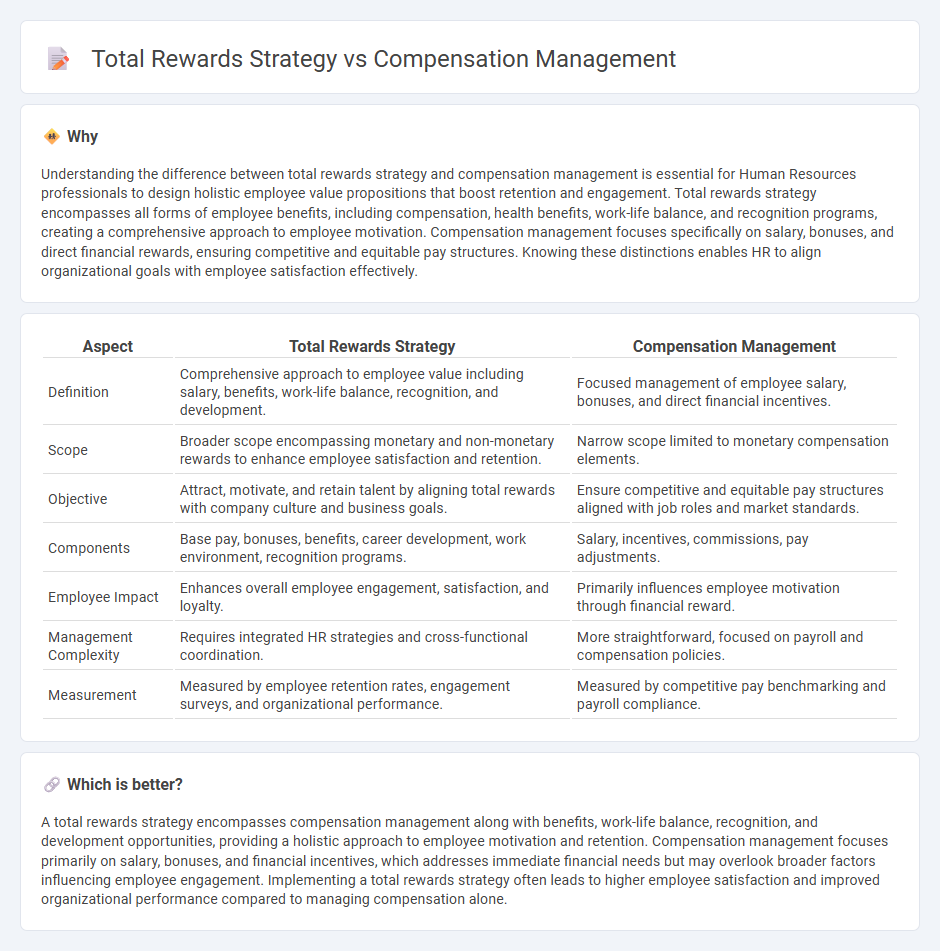
Total rewards strategy encompasses a comprehensive approach to employee benefits, including compensation, benefits, work-life balance, performance recognition, and career development opportunities. Compensation management specifically focuses on the design, administration, and evaluation of salary, bonuses, and incentives to attract and retain talent. Explore how integrating total rewards strategy with compensation management can optimize workforce motivation and organizational success.
Why it is important
Understanding the difference between total rewards strategy and compensation management is essential for Human Resources professionals to design holistic employee value propositions that boost retention and engagement. Total rewards strategy encompasses all forms of employee benefits, including compensation, health benefits, work-life balance, and recognition programs, creating a comprehensive approach to employee motivation. Compensation management focuses specifically on salary, bonuses, and direct financial rewards, ensuring competitive and equitable pay structures. Knowing these distinctions enables HR to align organizational goals with employee satisfaction effectively.
Comparison Table
| Aspect | Total Rewards Strategy | Compensation Management |
|---|---|---|
| Definition | Comprehensive approach to employee value including salary, benefits, work-life balance, recognition, and development. | Focused management of employee salary, bonuses, and direct financial incentives. |
| Scope | Broader scope encompassing monetary and non-monetary rewards to enhance employee satisfaction and retention. | Narrow scope limited to monetary compensation elements. |
| Objective | Attract, motivate, and retain talent by aligning total rewards with company culture and business goals. | Ensure competitive and equitable pay structures aligned with job roles and market standards. |
| Components | Base pay, bonuses, benefits, career development, work environment, recognition programs. | Salary, incentives, commissions, pay adjustments. |
| Employee Impact | Enhances overall employee engagement, satisfaction, and loyalty. | Primarily influences employee motivation through financial reward. |
| Management Complexity | Requires integrated HR strategies and cross-functional coordination. | More straightforward, focused on payroll and compensation policies. |
| Measurement | Measured by employee retention rates, engagement surveys, and organizational performance. | Measured by competitive pay benchmarking and payroll compliance. |
Which is better?
A total rewards strategy encompasses compensation management along with benefits, work-life balance, recognition, and development opportunities, providing a holistic approach to employee motivation and retention. Compensation management focuses primarily on salary, bonuses, and financial incentives, which addresses immediate financial needs but may overlook broader factors influencing employee engagement. Implementing a total rewards strategy often leads to higher employee satisfaction and improved organizational performance compared to managing compensation alone.
Connection
Total rewards strategy and compensation management are interconnected through their shared goal of attracting, motivating, and retaining talent by offering competitive salary packages, benefits, and incentives. Effective compensation management ensures alignment with the total rewards framework, balancing direct pay with non-monetary benefits to enhance employee engagement and satisfaction. Data-driven analysis of market trends and internal equity guides adjustments in compensation practices, reinforcing the total rewards strategy's ability to support organizational objectives.
Key Terms
**Compensation Management:**
Compensation management involves designing, implementing, and maintaining salary structures and benefits to attract, motivate, and retain employees effectively. It includes base pay, bonuses, incentives, and compliance with legal regulations to ensure competitive and equitable remuneration. Explore how strategic compensation management can enhance organizational performance and employee satisfaction.
Base Salary
Compensation management primarily centers on structuring base salary to ensure internal equity and market competitiveness, directly influencing employee retention and satisfaction. Total rewards strategy integrates base salary within a broader framework that includes benefits, incentives, and work-life balance to drive holistic employee engagement and organizational performance. Explore how aligning base salary with total rewards can optimize talent management effectiveness.
Pay Structure
Compensation management centers on designing and maintaining a competitive pay structure that aligns salaries with job roles, market benchmarks, and internal equity to attract and retain talent. Total rewards strategy encompasses compensation management but integrates additional components such as benefits, work-life balance, recognition, and career development to enhance overall employee value proposition. Discover how optimizing pay structures within a total rewards framework can drive organizational performance and employee satisfaction.
Source and External Links
The Complete Guide to Compensation Management - Compensation management is the practice of planning and distributing a company's overall pay and benefits package to employees, ensuring salaries and bonuses remain competitive and equitable while aligning with business goals and compliance requirements.
Compensation Management Essentials: A Comprehensive Guide - Compensation management involves designing and overseeing an organization's pay structure, including salaries, bonuses, and benefits, balancing internal equity with external competitiveness and linking pay to performance outcomes.
Compensation Management Process: A Guide for Firms - Compensation management is a strategic process of designing, implementing, and managing employee remuneration, including base salary, bonuses, and complex incentives such as equity stakes, aiming to motivate, retain, and align employees with a firm's success.
 dowidth.com
dowidth.com